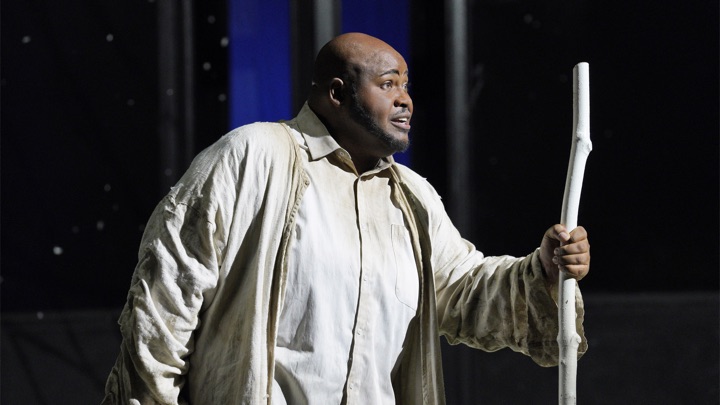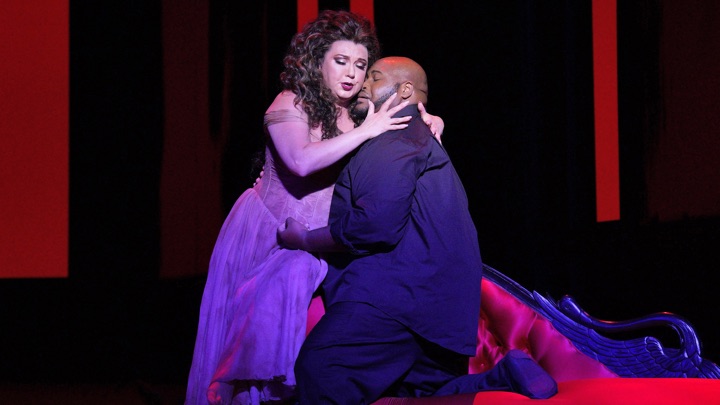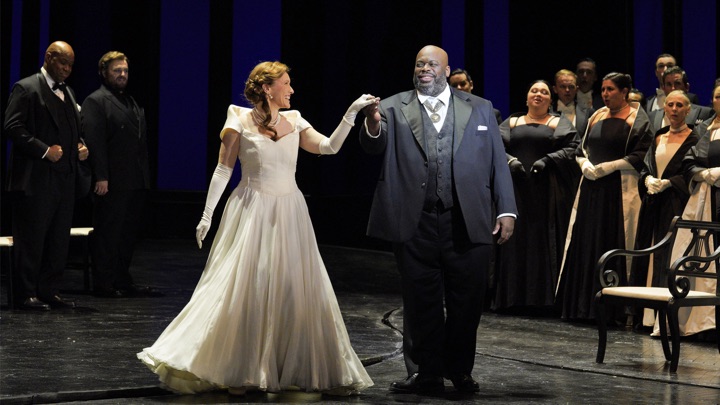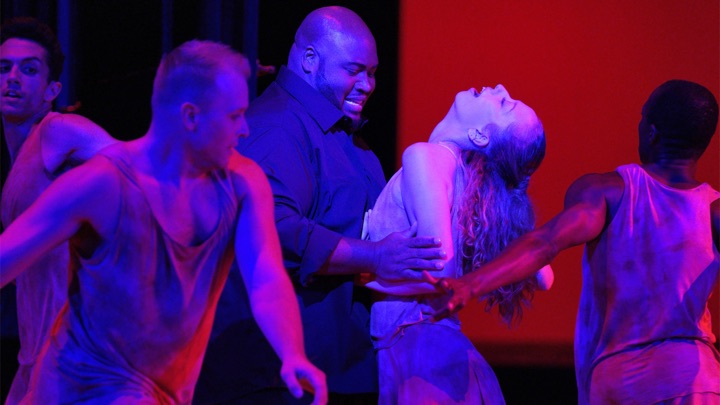

Apparently it’s a shared cultural experience. What with the vaccination bracelets and now the Jumbo-Tron’s blasting Wagner it’s looking a lot more like Coachella every time I attend LA Opera now.
A friend asked me if Tannhäuser was one of my favorites and my reply was,”Not really, I only have two recordings”. Obviously not as fascinating to me as the fleet of Fleigende Holländers that adorn my bookcase shelves. To say nothing of my armada of Tristans. Complete Ring cycles? I’ve shown extraordinary restraint in only procuring five. But, no, Wagner’s tale of Heinrich the Wayward Minnesinger isn’t getting a lot of love here at Schloss Mack.
Remember that time you went to the opera and the whole evening was like magic? I’ve had a couple and there’s nothing like it. Saturday night at the Dorothy Chandler Pavilion probably ranks among my greatest nights in the theater and I’m finding the superlatives in my thesaurus inadequate to the task.
Conlon started the overture and the horns not only managed to behave but play with real assurance from the start. Yet it was when the strings kicked in that I started to realize what we were in for. I haven’t heard playing that full and dark from any string section since Carlo Maria Giulini had the reins over at the LA Phil.
With the exception of a few give and tugs in the Act II introduction and then a micro-bobble or two during the arrival of the guests later synchronization between pit and stage was faultless. The interplay within the winds was like magic all evening. The constantly shifting harmonies and tempos in the orchestra felt so firmly led.
Then, at the end of the evening I was surprised to see only one harpist in the pit, so someone please give JoAnn Turovsky a bonus right now. I’m pretty sure we got the “Vienna” version of the score but I’m not the musicologist on Tannhäuser that I am with some other works so don’t quote me.
The Chorus did some of the best singing I’ve ever heard from them. This is true most especially in a work with so many pitfalls due to offstage entrances and barely accompanied sections that are always in danger of going pitch imperfect. They numbered nearly 60 voices and made a massive sound that left many of us literally gasping for breath behind our masks.
We were cast from strength even down to the Shepherd of Erica Petrocelli, our most recent Musetta, and tenor Robert Stahley, who’s a member of our young artist’s program to watch, as an intensely strong Walther.
Morris Robinson was a tower of strength throughout as Hermann and his contribution to the ensemble of the second act simply can’t be underestimated. The amount of sound rolling out of that man was enormous. He was touching in his dealings with Elisabeth and did especially good character work trying to keep the song contest from turning into a brawl while managing to actually heighten the tension onstage.
Having already seen Lucas Meachem as Rossini’s and Corgiliano’s Figaro I felt I’d already heard the measure of his plangent baritone. His Wolfram was so stentorian, in the best way, and he never sacrificed beauty of tone for volume.
Then in the last act, in the lead-up to “O du mein holder,” his concentration of voice and attention to the text were so enthralling that when the aria proper started it took me by surprise. It’s not like I didn’t know it was coming, it’s just that he tapped into that special alchemy a performer has when they momentarily make time stand still. Then the aria itself was like frosting: rapturous.
Health and human services at the Venusberg are being overseen by mezzp Yulia Matochkina and I knew we were in good hands the moment she opened her mouth. A mainstay at the Mariisky she has a luscious Dalila voice and the physique du rôle to match. She just poured forth all evening and actually made me sad the role of Venus is so relatively short.
As her earthly antithesis we were blessed with the formidable Sara Jakubiak as Elisabeth who not too long ago came to my attention from the recent video release of Korngold’s Das Wunder der Heliane from the Deutsche Oper Berlin. She makes an excellent impression there but live her voice is even more exciting. No fainting jugendliche, she sports a sizeable spinto soprano that left me begging to hear her as Sieglinde.
Her paean to the hall of song was assured from the start with a gentle middle section and then a penultimate phrase that set the normally dry acoustics of the Dorothy Chandler ringing. Her outburst at “Haltet ein!” to save Tannhäuser was so tremendous and what followed, vocally and dramatically, just showed the great command she has of her art. Her acting might have been a tad cool at times but that’s the character too. Ms. Jakubiak moves beautifully on stage and her singing is always superbly impassioned.
But the name of the show is Tannhäuser and I have to be honest that I hadn’t heard much of, or about, Issachah Savage before he was announced to make his role debut in this production. The LA Opera website promises that Mr. Savage will “knock your socks off” and for once the publicity department isn’t resorting to hyperbole.
Honestly I can’t recall the last time I heard a tenor with so beautiful, so sizeable, and focused an instrument. It’s not one of these Helden voices that has a big baritonal “burr” on it that actually negates it’s carrying power. I also don’t want to give the impression that there was no effort involved.
Yes there were brief (very brief) moments in both Acts I & III where the phonation was off the very top of the voice. Wagner’s writing for tenor, in general and Tannhäuser specifically, could never be called grateful. Yet Mr. Savage met all these challenges head on and with a fearsome musicality and unexpected grace. His sung German was beautiful and he never resorted to the notorious “Bayreuth bark” for emphasis.
For a debutante his “Rome Narrative” has all the building blocks in place and will surely grow with performance. His initial punch-drunk reactions to Wolfram’s questioning were creepy-splendid and the size and spin he managed on the “Curse” was titanic. He and Ms. Jakubiak even garnered some spontaneous applause after their initial Act II duet.
Mr. Savage showed no trouble riding out over the ensembles, the chorus, his colleagues, and the orchestra at full force. Frankly throughout the song contest and the ensuing finale it started to become overwhelming at each new entrance by the soloists as they all threw down a vocal gauntlet that they would not be bested by each other.
The production, which was originally directed by Ian Judge in 2007, has been handed over to Louisa Muller and is mostly a success. Featuring stunning set and costumes by Gottfried Pilz, with two turntables with walls of black semi-reflective metal at regular angles with floor to ceiling glass doors. It was so ingenious in design, with the help of Marcus Doshi’s very evocative lighting, that I wouldn’t be able to draw you a diagram, the multiple spaces they created were so varied.
Mr. Pilz’s costumes looked grounded in the 1930’s and tended to mostly black and white save for a sensuously flowered and form-fitting dress for Venus. Ms. Jakubiak wore a glorious white ball gown for the song contest with a high-standing collar so iconic and flattering that if she has any sense it will be missing from her dressing room closet after the last performance.
The arrival of the guests in Act II started out slightly kitschy but then became a stunning coup de theatre as it went through three successive scene changes thanks to those ever shifting turntables. We had snow in the last act (in spite of the autumn splendor Wagner mentions) but it was beautifully done so I quibble not. My one contention is that when the pilgrims arrived from Rome most of their hoods were already down which negated the desperation of Elisabeth’s search.
Aszure Barton was responsible for the tastefully erotic ballet in the Venusberg which for once didn’t inspire mirth from the audience. Eight identically clad dancers, four women and four men, in shifts with skirts and in all of the sexual pairings you could imagine. I’m sure exactly this was as Herr Wagner would have wanted.
In retrospect the whole thing seems like a fever dream. Nearly a half hour of bows and crazed applause at the end and I didn’t get to sleep until after 3 a.m. I was so overwhelmed.
There are two live streams coming up for a fee. For anyone outside of Los Angeles or unable to attend I cannot recommend this production highly enough. My whole outlook on this opera has changed because of the magnificent sweep of this performance and its cast. There now, I’ve run out of superlatives.
Photos: Cory Weaver / LA Opera




























Comments